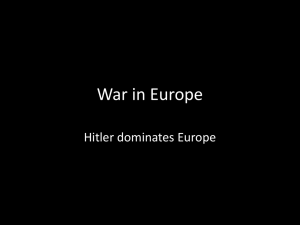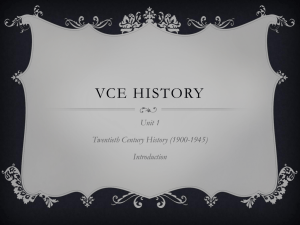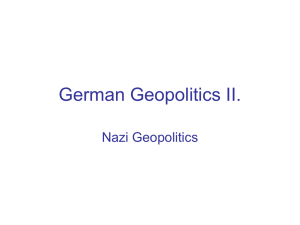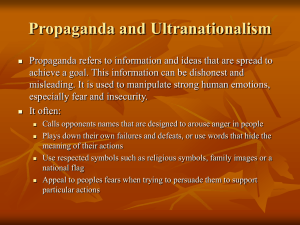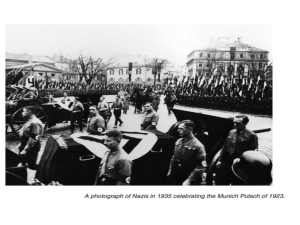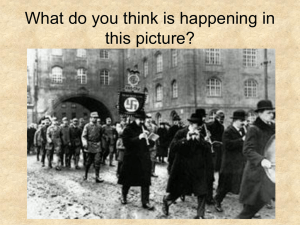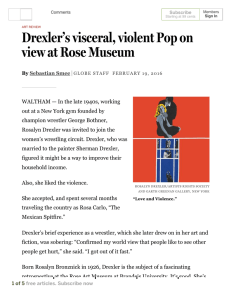NSDAP ideology. The early years and the Munich
advertisement
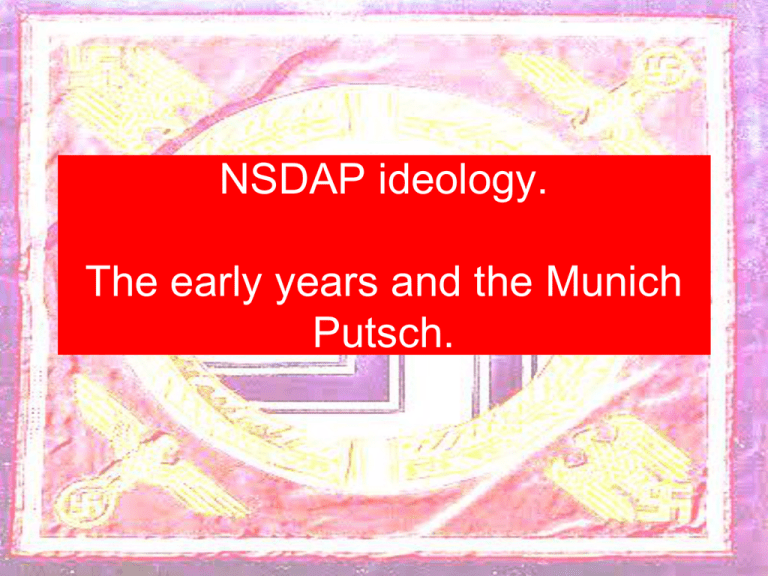
NSDAP ideology. The early years and the Munich Putsch. Connector What do you associate with this symbol? Outcomes • To know the timeline of the early years of the NSDAP • To know the ideology of the NSDAP • To know the early years of activity of the NSDAP Myths • The Nazi’s were not fouded by Hitler • The Nazi’s were not necessarily a right wing party • The Nazi’s ideas were not new • The Nazi’s ideology is not always seen as a coherent set of ideas but a melting pot of what was suitable at the time Time line • 1919- German Workers Party founded (DAP) by Anton Drexler (Deutsch Abieter Party) • 1920- 25 point programme agreed, outlining the Nazi ideology by Hitler and Drexler, name changed to National Socialist German Workers Party (NSDAP) • 1923 November- Munich Beer Hall Putsch in Munich • 1924- Hitler sent to Landsberg prison • 1925- Feb- NSDAP-reformed in Munich • 1926-Feb- Hitler leadership established over Drexler • 1928- Reichstag election result Hitler’s ideas after WW1 • Enthusiastic German nationalism • Support of an authoritarian government and opposition to a democracy and socialism • A racially inspired view of society which exhibited itself most beliefs of antiSemitism and the belief of the master Volk race (social Darwinism) German Workers Party • This sounds socialist but was not • Established by Anton Drexler in 1919 • It was committed to anti Semitism and nationalism and anti-capitalist • The ideas appealed to Hitler and he joined, becoming one of its best orators and energetically organising propaganda- the symbols, the uniform, the salute • By 1921 he was the driving force behind the party • By now the membership had risen to 3300 and had organised the formation of armed squads to protect party meetings – (Sturm Abteilung- or SA) and also to intimidate opposition. Wore brown shirts. Not part of army but paramilitary 25 Point Programme • Drawn up by Drexler and Hitler in 1920 • Read it here Hitler vs Drexler • By now Drexler was becoming alarmed at Hilter’s dominance of the party and tried to limit his political influence • Now Hitler showed his political skills and ability to gamble, so he offered to resign • In two meetings in July 1921 he quickly gained support and Drexler resigned leaving Hitler gloriously triumphant Consolidation of power • He was further strengthened his position by increasing the role of the SA and Rohm • He established the party’s first newspaper the Volkischer Beobachter (People’s Observer) • By 1922 he had the backing of Julius Streicher who published an anti- semetic newspaper- Der Sturmer • He also gained the support of the influencial Herman Goring who joined in 1922. He born into a landowning Bavarian family and gave Hitler influence in Munich (and respectability) • By 1923 the NSDAP had a membership of 1923, but was still one of the many fringe right wing organisations spread across German, with its influence limited to Bavaria Beer Hall Putsch • Mussolini successfully overtook Italy in 1922 by marching on Rome, so combined with the problems in Germany Hitler believed he could do the same • But the Nazi’s were too weak to do this on their own so they required allies- such as Kahr in Bavaria and Lossow in the Bavarian army • They aimed a march on Berlin using all the armed forces from Bavaria-police, army, SA • However this plan was doomed – – – – There was little support in Weimar for a putsch It lacked real planning It relied on support from Ludendorff too much Kahr and Lossow pulled out at the last minute 8th November • Hitler was addressing a crowd in one of Munich beer halls when he declared a national revolution and forced Lossow and Kahr to support it • The next day Goring, Streicher, Rohm, Himmler and Ludenfdorff marched into Munich with 2000 SA men but with no real military backing and tried totake over Munich • This was crushed by the police and 14 Nazi’s killed and Hitler put on trial Consequences • He turned the trial into a propaganda success and evoked patriotism and nationalism • He won the respect of many other right wing parties for having the courage to act • He received a sentence of 5 years reduced to 10 months which seemed to endorse his acts by the judicary • He used his months in prison to write a book called Mein Kampf which outlined his ideas • He decided that if he was to seize power it would have to be legitimatly Task 1 • Find out what happened during the Munich Beer Hall Putsch – Read page 115/116 of classbook – Add notes to your notes Ideology • “Was Nazism an original German ideology?” – Racism – Anti-democracy – Nationalism Homework • “Was Nazism an original German ideology?”


